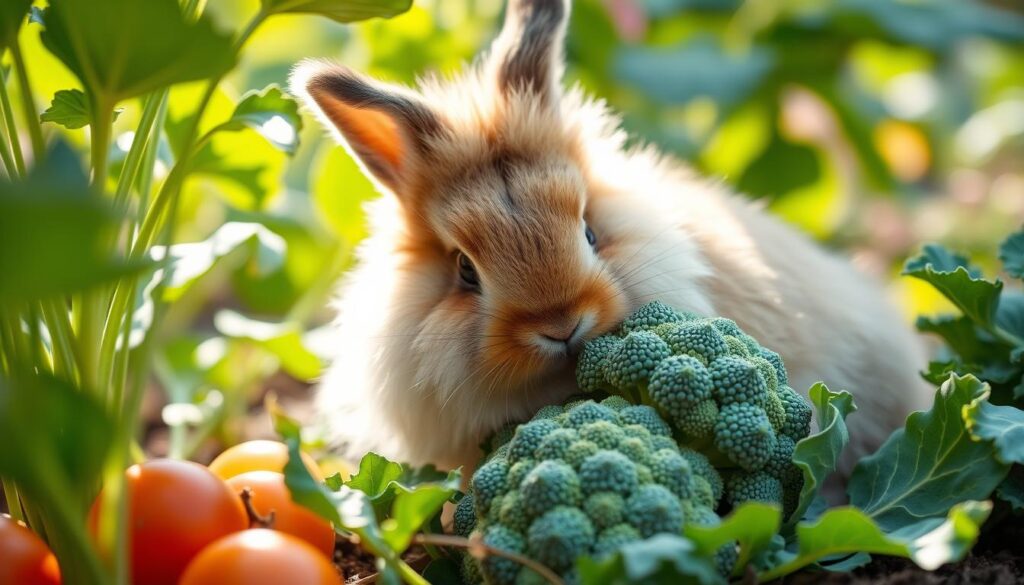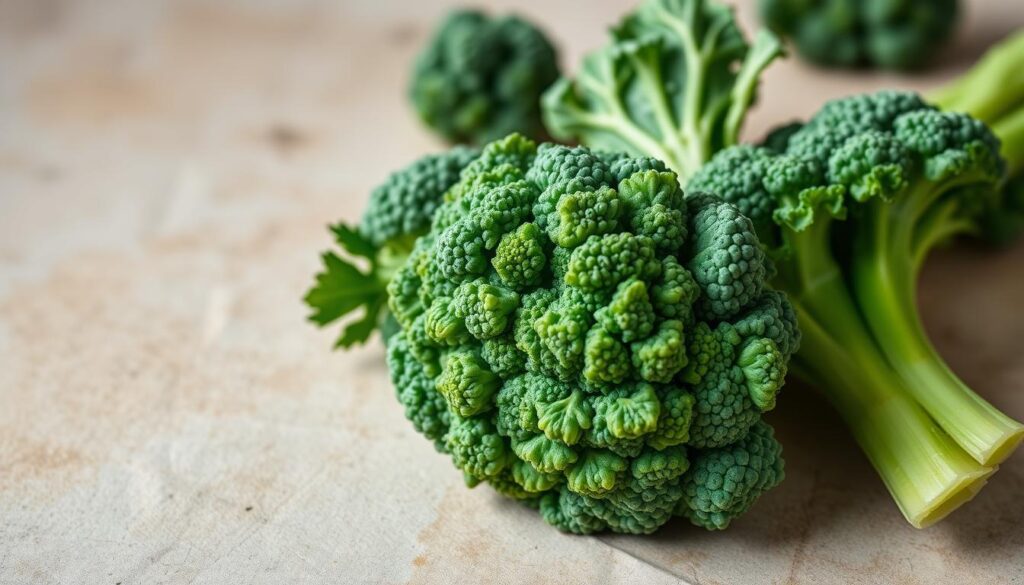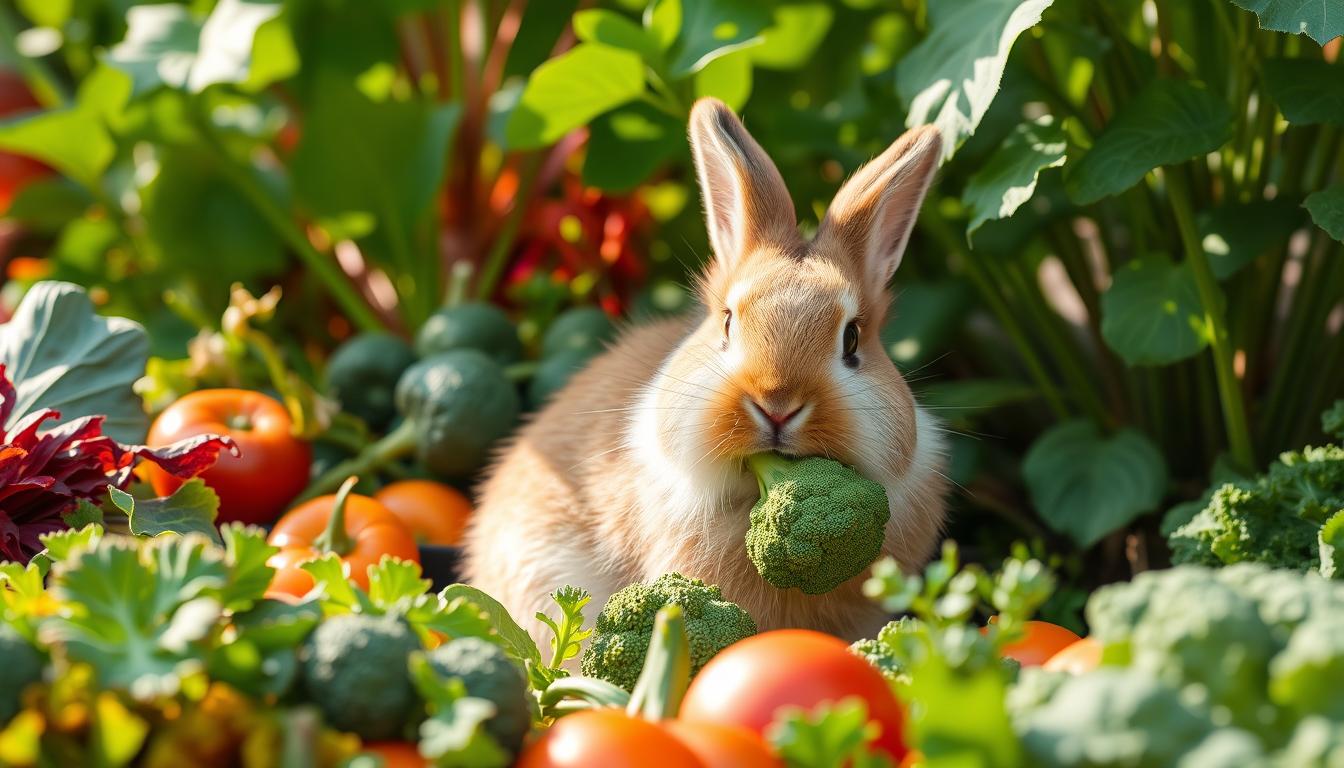Are you curious if your furry friend can enjoy raw broccoli? As a dedicated rabbit owner, knowing what’s safe for them is key. This guide will help you understand if rabbits can eat raw broccoli.
Rabbits have unique dietary needs, and it’s up to you to keep them healthy. Some veggies are good, but others might be harmful. Let’s explore how raw broccoli fits into a rabbit’s diet.
Table of Contents
Understanding Rabbit Diet Basics
Proper rabbit nutrition is key for their health and happiness. A rabbit’s diet should mainly be hay or grass, making up about 80% of their food. Hay is crucial for proper digestion and dental health, so it should always be available to your rabbit.
The Importance of Hay in Rabbit Diet
Hay is the base of a rabbit’s diet. It gives them the fiber they need for good digestion and healthy teeth. Rabbits’ teeth grow continuously, and chewing hay helps keep them healthy. Offer your rabbit a variety of high-quality hay, such as timothy, orchard grass, or meadow hay, to ensure they get all the nutrients they need.
Daily Water Requirements
It’s also important to make sure your rabbit always has fresh, clean water. Rabbits need a lot of water to stay healthy. Provide your rabbit with heavy ceramic bowls or drip-feed bottles to encourage them to drink regularly. Check their water often and refill it every day to keep them hydrated.
Optimal Food Distribution
- 80% hay or grass
- 10% fresh vegetables
- 5% fresh fruits
- 5% high-quality pellets
This balanced diet, with hay as the main part, makes sure your rabbit gets all the nutrients they need. Always introduce new foods slowly and watch for any signs of upset stomach.
Can Rabbits Eat Raw Broccoli
Yes, rabbits can eat raw broccoli safely. It’s a nutritious veggie that gives them important vitamins, minerals, and fiber. But, it’s important to add broccoli slowly and in small amounts to avoid stomach problems.
Rabbits should only have 1-2 small broccoli heads and a few leaves at a time. Broccoli should not be more than 5% of their daily food. The rest should be timothy hay, good pellets, and other veggies.
Broccoli is full of vitamin C, K, A, folate, calcium, and potassium. These are key for rabbits. It also has lots of fiber, which helps their digestion and prevents constipation.
But, eating too much broccoli can cause gas and stomach issues. Broccoli also has oxalic acid, which can lead to kidney stones in rabbits. So, it’s important to stick to the recommended amounts.
If your rabbit shows signs of not liking broccoli, like diarrhea or not wanting to eat, stop giving it to them. Always watch how they react to new foods to keep them healthy and happy.
| Broccoli Feeding Guidelines for Rabbits |
|---|
| Recommended Serving Size: 1-2 small/medium flower heads and a couple of leaves per feeding |
| Maximum Percentage of Diet: 5% broccoli, 80% timothy hay, 10% other vegetables, 5% fruits and high-quality pellets |
| Feeding Frequency: 1-2 times per week, with close monitoring for any adverse reactions |
| Broccoli Parts Safe to Feed: Florets, leaves (stems may cause more gas) |
By following these guidelines and watching your rabbit, you can add raw broccoli to their diet safely. This way, they get the good stuff broccoli has to offer.
Nutritional Benefits of Broccoli for Rabbits
Broccoli is a nutritional powerhouse for your rabbit’s health. It’s packed with vitamins, minerals, and fiber. These make it a great addition to their diet.
Vitamin Content Analysis
Broccoli is full of Vitamin C, Vitamin K, and Vitamin A. These vitamins are key for your rabbit’s health. Vitamin C boosts the immune system. Vitamin K helps with blood clotting and bone growth. Vitamin A is good for vision, skin, and cell growth.
Mineral Composition
Broccoli also has lots of calcium and potassium. Calcium is important for strong bones and teeth. Potassium keeps muscles working right and helps with fluid balance.
Fiber Benefits
The fiber in broccoli is great for rabbits. It helps with digestion and keeps bowel movements regular. Fiber keeps the digestive system working well, which is key for your rabbit’s health.
“Broccoli is a nutritional powerhouse that can offer an array of benefits for your rabbit’s health.”
Potential Risks and Dangers of Feeding Broccoli
Broccoli is good for your rabbit, but too much can be bad. Rabbits might have trouble with broccoli’s high calcium and oxalic acid. This could lead to urinary problems or bladder stones.
Broccoli also makes gas, which can upset a rabbit’s stomach. Rabbit digestive issues can happen when they try new foods. So, watch your rabbit closely after they eat broccoli.
Broccoli side effects to watch out for include:
- Diarrhea or changes in fecal output
- Decreased appetite or reluctance to eat
- Abdominal pain or discomfort
- Lethargy or lack of energy
To avoid these problems, make sure broccoli is fresh and clean. Only give it as an occasional treat, not a main part of their diet.

By watching how much broccoli you give and how your rabbit reacts, you can safely add it to their diet. But, if you see any bad signs, stop giving broccoli and talk to your vet.
Safe Portions and Feeding Frequency
Feeding your rabbit raw broccoli needs careful attention to portion sizes. For a 2kg rabbit, give 1-2 small broccoli florets and a few leaves daily or every few days. Make sure to add other veggies and herbs too.
Recommended Serving Sizes
The right broccoli serving size is about half an inch per 2 pounds of your rabbit’s body weight. Adjust this based on your rabbit’s age, weight, and how well they can digest broccoli. This ensures they stay healthy.
Weekly Feeding Schedule
- Give broccoli to your rabbit 2-3 times a week, in small amounts.
- Start with small broccoli portions to see how your rabbit reacts.
- Also, give them other veggies and greens for a balanced diet.
Age-Based Portions
Consider your rabbit’s age when feeding broccoli:
- Baby rabbits (under 6 months): Don’t give them uncooked veggies until they’re 6 months old.
- Young rabbits (6-12 months): Start with a little broccoli and slowly increase it.
- Adult rabbits (over 12 months): Give them broccoli in moderation as part of a healthy diet.
| Rabbit Age | Broccoli Serving Size |
|---|---|
| Baby (under 6 months) | Avoid uncooked vegetables |
| Young (6-12 months) | Start with small quantities, gradually increase |
| Adult (over 12 months) | Offer in moderation as part of a balanced diet |
Having a rabbit feeding guide is key. It helps make sure your rabbit gets the right broccoli serving size. This supports their health and happiness.
Different Parts of Broccoli: What’s Safe to Feed
Feeding broccoli to your rabbits is safe and healthy. They can enjoy many parts of the plant. This includes the leaves, stalks, and stems.
Broccoli leaves are a great choice because they’re full of fiber and nutrients. They’re also easier for rabbits to digest than the broccoli stems. The stalks and stems are safe but a bit harder to chew.
The broccoli florets are edible but might upset your rabbit’s stomach. Leaves usually cause less gas than stems or florets. So, they’re a safer option for your rabbit.
“Vegetables should make up about 10-20% of a rabbit’s diet, and broccoli leaves can be a great addition to their daily menu.”
When adding broccoli to your rabbit’s diet, start small and watch for any signs of upset. A balanced diet is crucial for their health and happiness.

Nutritional Benefits of Broccoli Leaves
- High in fiber, essential for healthy digestion
- Rich in vitamins C, K, and A, supporting immune function and bone health
- Moderate water content, aiding in hydration
- Relatively low in calories, helping maintain a healthy weight
Knowing which parts of broccoli are safe for rabbits helps you give them a varied and nutritious diet. Adding broccoli leaves and other veggies can keep your rabbit happy and healthy.
Signs of Broccoli Intolerance in Rabbits
Broccoli can be good for your rabbit’s diet, but watch for signs of intolerance. Rabbits, like people, can have digestive problems with new foods, like raw broccoli. It’s key to watch how your rabbit reacts to keep them healthy.
Digestive Issues to Watch For
Look out for signs your rabbit might not be digesting broccoli well. These include:
- Lethargy and reduced activity levels
- Gurgling or rumbling sounds from their stomach
- Unusual postures, like lying on their side or hunching over
- Decreased appetite or avoiding food and water
Emergency Warning Signs
More serious symptoms need vet help right away. These include:
- Severe bloating or gas buildup, which can be painful and even life-threatening for rabbits
- Persistent diarrhea or constipation lasting more than a day
- Visible signs of discomfort, such as teeth grinding or labored breathing
If you see these emergency signs, call your vet fast. Quick action is key to fix any rabbit health problems and stop broccoli intolerance issues.
Every rabbit is different, and they may react differently to new foods. By watching your rabbit closely and getting vet help when needed, you can keep them healthy and happy.
Introducing Broccoli to Your Rabbit’s Diet
Adding new foods to your rabbit’s diet needs careful steps. Broccoli is healthy but should be given slowly and in small amounts. Start with tiny broccoli pieces and watch for any signs of trouble. If your rabbit seems okay, you can give more.
Changing your rabbit’s diet too fast can upset their stomach. So, introduce broccoli and other new veggies one at a time. This lets their body get used to it. For young rabbits, wait until they’re at least 6 months old before adding broccoli to their diet.
Keeping your rabbit’s diet balanced is key to their health. Make sure they eat a mix of safe veggies, like leafy greens and broccoli. This way, they get all the nutrients they need and stay healthy.


1 thought on “Can Rabbits Eat Raw Broccoli: A Safe Feeding Guide”